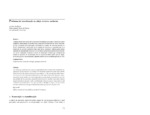Problemas de transliteração na edição de textos medievais

View/
Use this link to cite
http://hdl.handle.net/2183/2586Collections
Metadata
Show full item recordTitle
Problemas de transliteração na edição de textos medievaisAuthor(s)
Date
2002Citation
Revista Galega de Filoloxía, 2002, 3: 29-64. ISSN 1576-2661
Abstract
[Resumo] A edição de um texto medieval é um processo de mediação que afasta o texto do seu modo
original de representação, de acordo com a perspectiva interpretativa do editor. Neste artigo
faço a distinção entre transcrição (reprodução do conjunto de caracteres presente no
texto) e transliteração (substituição de um conjunto de caracteres), e argumento que (1) a
transcrição de um texto medieval é tanto mais fiel ao manuscrito original quanto menos
operações de transliteração envolver, e (2) as edições conservadoras para estudos linguísticos
devem idealmente constituir-se através de transcrições estreitas que impliquem um
mínimo de operações de transliteração. São em seguida discutidos quatro tipos de edição,
de diverso grau de conservadorismo, ilustrados através de um testamento privado de 1210. [Abstract] The edition of a medieval text is a process of mediation which distances the text from its original
mode of representation (according to the interpretive framework of the editor). In this
article I discuss the distinction between transcription (i.e. the reproduction of the character
set present in the text) and transliteration (i.e. the replacement of the character set present
in the text by another set). I also argue that the transcription of a medieval text is the
more faithful the less operations of transliteration it involves, and that conservative editions
meant primarily for linguistic studies should ideally be based on narrow transcriptions with
a minimum of transliteration. Four types of edition with different degrees of conservatism
are then considered; each type is illustrated by means of a private will from 1210.
Keywords
Edição de textos medievais
Filologia
Portugués medieval
Edition of medieval texts
Philology
Medieval portuguese
Filologia
Portugués medieval
Edition of medieval texts
Philology
Medieval portuguese
ISSN
1576-2661





